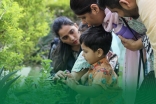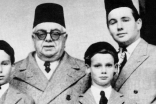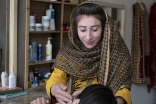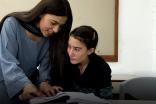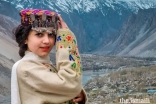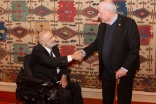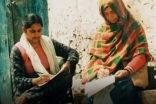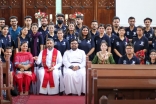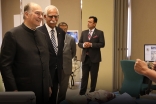Content Tagged with Our Community
Ismaili CIVIC Pakistan, in collaboration with government agencies, communities and volunteers, is working diligently towards environmental preservation on a large scale. Recently, to celebrate World Environment Day, Ismaili CIVIC partnered with Ismaili Councils across eight regions to initiate various impactful activities.
“Real happiness lies in inner satisfaction,” articulated Sherzad.
Sherzad hails from the beautiful Yaseen Village in the Ghizer District of Gilgit Baltistan. He graduated with honours in Journalism from the University of Karachi and worked with Dawn TV and the British Broadcasting Corporation (BBC). Although he was successful in his career, he felt a profound emptiness inside, a darkness he longed to fill with light. Sherzad identified the source of his discontent: the pressing issues of climate change and global warming, and his minimal contribution to addressing these problems. Furthermore, the income he was earning from his employment was not enough to fulfil the fundamental needs of his family.
Aujourd'hui, les Ismailis du monde entier célèbrent le Navroz, un festival qui marque le début d'une nouvelle année et le premier jour du printemps. Navroz signifie une période de renouveau spirituel et de rajeunissement physique, ainsi qu'un esprit
Meet Eshan Lakhani, a young, passionate musician from Australia who turned the mundane beat of pots and pans into a symphony of inspiration.
“I am determined and want to come back to my homeland and aspire to serve in the Aga Khan Development Network (AKDN),” quoted Afsheen Jiwani, Campaign Director at the University Health Network in Toronto, Canada and winner of the Canada’s Most Powerful Women: Top 100 Award Winner in the Community Impact category. This award is presented to her by the Women’s Executive Network (WXN). (WXN) a member-based organization, is North America's #1 and only organization that meaningfully propels and celebrates the advancement of professional women at all levels, in all sectors, and of all ages.
Some leaders transcend time, leaving a legacy that inspires future generations to leave the world a better place than when they inhabited it. Imam Sultan Mahomed Shah, Aga Khan III, was one such a visionary, whose contributions to politics, education and social reform left an indelible mark on the 20th century. As an influential statesman, his work shaped the course of history for Muslims in the subcontinent and beyond. His contributions are nothing short of remarkable - so much so that words often fall short in capturing their true depth. Born on 2 November, 1877, he was the 48th spiritual leader of the Shia Imami Ismaili Muslims and a pioneer in many spheres of life.
Striking a harmonious balance between one’s spiritual and worldly pursuits has always been an aspiration for Ismailis worldwide. Mawlana Hazar Imam has consistently emphasised the importance of maintaining this equilibrium. Meet Ali Baig, hailing from Yasin Tehsil Ghizer District, who is the Honourable Chief Justice of Gilgit-Baltistan (GB). Chief Justice Baig serves as a shining example of this fundamental principle. Throughout his illustrious professional journey, he has actively contributed to various Jamati institutions in diverse roles, embodying the essence of this balance.
Nahida Bibi, a 27-year-old from Sultanabad, Yasin, embodies the success of a businesswoman; one who starts with small investments and big hopes to establish themselves as a successful entrepreneur.
Hailing from Hundur, a remote valley of Yasin in Gilgit-Baltistan, Noor ul Ain is a student at the Ismailia Youth Service (IYS) in Karachi. She is an alumnus of the Bridge Programme and now mentor students at the Gahkuch Bridge Camp 2023. From the humble beginnings as a student of the Bridge Programme to becoming an advisor, her journey is an inspiration and shows the positive impact of the Aga Khan Education Board’s initiative of improving quality of life through education.
I’ll never forget the feeling of the sand beneath my feet as I walked along the beach, watching the tide come in. I’ll never forget the sound of 120 people wincing audibly as I dislocated my elbow at a middle school wrestling meet. Most of all, I’ll never forget the way the entire world and all its problems melted away as I sped down a hill on my longboard.
Noorima Rehan is a 17-year-old aspiring Ismaili vocalist from Ghulkin, Gojal, Hunza. Located approximately 142km from Gilgit, Ghulkin is situated on the west of Hunza in the Karakorum, surrounded by glaciers and streams. Noorima's love for music runs deep within her being, and she finds herself singing in every moment of her life. Her vocal skills have propelled her to new heights. Most notably, she recently represented Pakistan during King Charles III's Coronation Concert in London.
In a world grappling with the impacts of ecological crisis, a ray of hope shines through the tireless efforts of individuals dedicated to preserving our planet. Among them is Rozina Kanchwala, whose passionate advocacy is rapidly capturing attention.
On 4 March, at the Ismaili Centre Vancouver, two strangers came together to share a special moment — 50 years after first crossing paths during a milestone event in both of their lives.
An eminent Muslim leader, thinker and reformer of the 19th century, Sir Sultan Mahomed Shah, Aga Khan III was born in Karachi on the 2nd of November 1877. It is reported that when the Aga Khan I received word of his birth, he had replied, “Name him Sultan,” as he would earn a “distinguished position in the world.” Through Imam Sultan Mahomed Shah’s remarkable achievements over his lifetime, we learned this to be true.
From a village with restricted access to education, and peculiarity associated with working women, Laghli Zamrud defied all odds and became the first midwife of Chitral.
As the nation celebrated Pakistan’s 75th Independence Day with enthusiasm, the Ismaili Girl Guides rejoiced in the day by continuing their legacy of voluntary work. 1,800 Ismaili Girl Guides across Pakistan showed their love and patriotism for the country by indulging in social action and community service giving 6,500 minutes on 75 different projects, benefiting more than 3,500 people, reflecting on the multiple themes of Sustainable Development Goals (SDGs) set by United Nations to address global issues and challenges.
Sepak Takraw, a unique sport, also known as kick volleyball, is a team sport, played with a ball made of rattan or synthetic plastic, between two teams of two to four players on a court, resembling a badminton court. Unlike volleyball, in Sepak Takraw, players are not allowed to use their hands to play with the ball and are required to use their feet, head, knees and chest to volley the ball. An emerging sport in Pakistan, Sarfaraz Rehman and Deedar Rani Durdana Khan represented Pakistan at the King’s Cup Sepak Takraw World Championship in Thailand.
"A cosmopolitan society regards the distinctive threads of our particular identities as elements that bring beauty to the larger social fabric," replied Mawlana Hazar Imam in response to a question about globalization at Harvard University. The trend toward globalization has ushered us into an age of residing as a global village. To navigate through the challenges posed by increasingly globalized societies, it has become imperative to enhance and promote inter- and intra-religious harmony and develop mutual understanding and empathy based on an acknowledgement of religious diversity and differences.
For more than a century, the Aga Khan Development Network (AKDN) and its predecessor institutions have worked for under-developed communities in Asia and Africa to enhance their quality of life. The role of Imamat in the development of the subcontinent goes back to the time of Imam Sultan Mahomed Shah, who was a stalwart of education. He advocated for quality education and supported the Aligarh University Movement by providing funds, leadership and guidance. By establishing the first Aga Khan School in Gwardar in 1905, Imam Sultan Mahomed Shah laid the foundation of AKDN more than a century ago.


